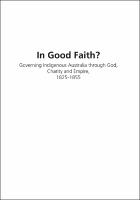In Good Faith?: Governing Indigenous Australia through God, Charity and Empire, 1825-1855
Abstract
In the early decades of the 19th century, Indigenous Australians suffered devastating losses at the hands of British colonists, who largely ignored their sovereignty and even their humanity. At the same time, however, a new wave of Christian humanitarians were arriving in the colonies, troubled by Aboriginal suffering and arguing that colonists had obligations towards the people they had dispossessed. These white philanthropists raised questions which have shaped Australian society ever since. Did Indigenous Australians have rights to land, rationing, education and cultural survival? If so, how should these be guaranteed, and what would people have to give up in return? Would charity and paternalism lead to effective government or dismal failure – to a powerful defence of an oppressed people, or to new forms of oppression?
In Good Faith? paints a vivid picture of life on Australia’s first missions and protectorate stations, examining the tensions between charity and rights, empathy and imperialism, as well as the intimacy, dependence, resentment and obligations that developed between missionary philanthropists and the people they tried to protect and control. In this work, Mitchell brings to life hitherto neglected moments in Australia’s history, and traces the origins of dilemmas still present today.
Keywords
politics and government; australia; social conditions; aboriginal australians; colonization; 19th century; Church Mission Society; Indigenous Australians; Indigenous peoples; Missionary; Philanthropy; WMMSDOI
10.26530/OAPEN_459277OCN
697326531Publisher
ANU PressPublisher website
https://press.anu.edu.au/Publication date and place
Canberra, 2011Series
Aboriginal History Monograph, 23Classification
History
Politics and government


 Download
Download Web Shop
Web Shop